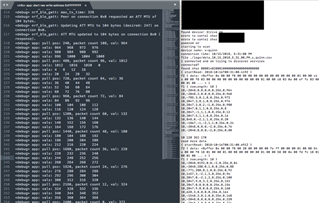Hi,
I'm having an issue when responding to rw_auth requests on the nrf52840 w/ sdk 15.0. When I'm attempting to update the table, If I make the length too large then it seems to update multiple times in the transmission. For every 1 read request I get at least 3 different sets of values. It appears to be independent of the server device because it happens if I trigger it from Noble (my computer) and nrfConnect.
Ideas:
- somehow the system can trigger multiple events if the user is too slow
- ? any other ideas would be helpful
Code that is having problems
static st_ble_pos_t m_pos;
NRF_SDH_BLE_OBSERVER(m_pos ## _obs, \
BLE_HRS_BLE_OBSERVER_PRIO, \
st_ble_pos_on_ble_evt, &m_pos)
uint8_t global_data[255];
void * working_read_handler(uint8_t * len, uint8_t * update) {
uint8_t packet_len = 20;
memcpy(global_data, __SOME_DATA__, packet_len);
*len = packet_len; *update = 1;
return global_data;
}
void * NOT_working_read_handler(uint8_t * len, uint8_t * update) {
uint8_t packet_len = 20;
uint8_t max_packets = (247/packet_len)*packet_len; //247 is the maximum transfer size I believe
memcpy(global_data, __SOME_DATA__, max_packets);
*len = packet_len; *update = 1;
//LOGGING code
uint8_t *p_data = global_data;
int16_t val = *(int16_t*)(p_data+18);
int16_t out[4], new_val;
out[0] = val;
for ( uint8_t i = 1; i < max_packets/packet_length; i++ ) {
p_data += packet_length;
new_val = *(int16_t*)(p_data+18);
if ( (val+4)%1024 != new_val) NRF_BREAKPOINT;
if (i%4==0) {
NRF_LOG_DEBUG("vals: %d %d %d %d",out[0],out[1],out[2],out[3]);
}
out[i%4] = new_val;
val = new_val;
}
NRF_LOG_DEBUG("vals: %d %d %d %d",out[0],out[1],out[2],out[3]);
//End LOGGING
return global_data;
}
void st_ble_pos_on_ble_evt( ble_evt_t const * p_ble_evt, void * p_context)
{
st_ble_pos_t * p_pos = (st_ble_pos_t *) p_context;
switch (p_ble_evt->header.evt_id)
{
...
case BLE_GATTS_EVT_RW_AUTHORIZE_REQUEST:
ble_gatts_rw_authorize_reply_params_t auth_reply;
auth_reply.type = BLE_GATTS_AUTHORIZE_TYPE_READ;
uint16_t handleRead=p_ble_evt->evt.gatts_evt.params.authorize_request.request.read.handle;
auth_reply.params.read.gatt_status=BLE_GATT_STATUS_SUCCESS;
auth_reply.params.read.offset = 0;
uint8_t update = 1;
uint8_t err_code;
if(p_ble_evt->evt.gatts_evt.params.authorize_request.request.read.handle == p_pos->desired_value_handle)
{
auth_reply.params.read.p_data = p_pos->read_handler(&auth_reply.params.read.len, &update);
}
auth_reply.params.read.update = update;
err_code = sd_ble_gatts_rw_authorize_reply(p_ble_evt->evt.gatts_evt.conn_handle,&auth_reply);
APP_ERROR_CHECK(err_code);
}
Output:
The values on the left are rtc ticks for data the is collected at 1/4th the frequency (so they should increment by 4, with a max value of 1020 as 1024==0)
These values should line up with the right most column of the data in the right half of the picture, but this data has the jumps in it. in the first data set there are jumps from 980->8 (1032) and 24->76

Thanks for any help,
Quinn


